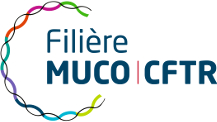- Details
The different actors of the Network interact at the European level for the most part with the ECFS (European Cystic Fibrosis Society) through:
- participation in the clinical research network, ECFS-Clinical Trial Network (CTN) set up in 2008 for which the centers of seven interregional networks in France were selected through a call for proposals
- the CF Europe federation of patient associations
- participation of the French registry in the European registry (ECFS Patient Registry)
- participation in working groups on the publication of European care standards
- regular connections maintained by the French Cystic Fibrosis Association with its German, British, and Belgian equivalents.
- Details
The plan of actions (2016–2018) of the Cystic Fibrosis-CFTR Network is broken down into four axes made up of the Network’s missions:
Axis 1: Propel/coordinate actions aiming to improve patient management/treatment.
- Action 1 – Ensure the transfer of certain data of the Cystic Fibrosis Registry toward the BNDMR (National Rare Disease Database);
- Action 2 – Coordinate and write the National Protocol for Diagnosis and Care of Cystic Fibrosis (PNDS, Protocole National de Diagnostic et de Soins Mucoviscidose);
- Action 3 – Set up a shared medical decision project;
- Action 4 – Pursue therapy education program;
- Action 5 – Develop projects around the transition from childhood to adulthood.
Axis 2: Develop teaching, education, and information.
- Action 1 – Develop an e-learning program designed for private-practice nurses;
- Action 2 – Organize specialized seminars.
Axis 3: Favor/develop the value of the continuum between fundamental, translational, and clinical research.
- Action 1 – National coordination through the National Clinical Research Platform (Plateforme Nationale de Recherche Clinique, PNRC);
- Action 2 – Organization of Network Days (French-language Days, Scientific Days).
Axis 4: Encourage interactions with Europe and the world (see also the International cooperation section)
- Action 1 - Integration of three centers (Lyon, Paris Cochin, and Paris Necker) into the European Rare Disease Network ERN-LUNG.
- Details
La Société Française de la Mucoviscidose (French Cystic Fibrosis Society)
Created in 2004, the French Cystic Fibrosis Society (Société Française de la Mucoviscidose, SFM) is both the Federation of rare disease reference centers and a learned society: it groups the professionals involved in the disease for care (hospital and private practice), care support (notably genetic, biology, and microbiology laboratories) and research (fundamental, clinical, and translational). This is an organization for reflection, dialogue, and proposals concerning the organization of cystic fibrosis healthcare and research.
https://muco-cftr.fr/index.php/fr/la-filiere/la-societe-francaise-de-la-mucoviscidose
L’association Vaincre La Mucoviscidose (French Cystic Fibrosis Association)
Created in 1965 and recognized for its public utility in 1978, it is managed by an elected board of directors composed for the most part of parents and patients as well as physicians, researchers, and supporters, all volunteers. Professional employees implement the actions serving the four missions of the association: heal, provide care, live better, and raise awareness.
The Network’s partners
The rare disease reference centers (CRMRs) and the cystic fibrosis resource and skills centers (CRCMs)
The Network includes one coordinating center, four constitutive centers, and 42 CRCMs.
- Coordinating center (Cochin, Paris): the center with the longest active list of adult patients, highly involved in academic and industrial research and internationally recognized. It is an approved center within the European reference network (ERN Lung-Cystic Fibrosis).
- Constitutive center (Lyon Sud Hospital, Lyon): second adult center (excluding transplantation), it is notably developing projects around adult late comorbidities. It is an approved center of the European reference network (ERN Lung-Cystic Fibrosis).
- Constitutive center (Necker, Paris): second largest pediatric center in France, it is recognized for its scientific expertise and translational research. It is an approved center of the European reference network (ERN Lung-Cystic Fibrosis).
- Constitutive center (Fondation Ildys, Roscoff): this center has long been specialized in therapy education and the improvement of healthcare quality.
- Constitutive center (Foch, Suresnes): this site possesses recognized expertise at the national level, recognized by professionals and patients, in lung transplantation.
Local professionals
Healthcare networks
Genetics laboratories
Lung transplantation centers
Research laboratories
- Details
- Propel/coordinate actions aiming to improve patient management/treatment.
- Favor the coordination of multidisciplinary expertise within the network;
- Favor the writing and use of good practice guidelines and protocols within the network;
- Favor the coordination of healthcare with the medical-social sector and the social or educational sectors when needed;
- Favor the creation and incrementation of registries, data collection, and feed the National Rare Disease Database (Banque Nationale de Données Maladies Rares, BNDMR);
- Anticipate demographic changes and new needs in terms of healthcare organization.
- Develop teaching, education, and information.
- Make the network visible to patients and healthcare professionals;
- Undertake educational actions within the network;
- Reinforce the links and reciprocal information with the network’s associations.
- Favor/develop the value of the continuum between fundamental, translational, and clinical research.
- Reinforce the links between the different research actors;
- Coordinate research actions;
- Encourage and support research.
- Encourage interactions with Europe and the world.
- Reinforce the links with European actions and programs (registries, research, etc.);
- Favor the setting up of a European reference network on rare diseases.
- Details
The mission of rare disease networks (FSMR) is to facilitate the orientation of patients, collecting health data, dissemination of good practices, and coordination of research, teaching and learning actions.
These networks target rare diseases, i.e., occurring in fewer than one person in 2000 (fewer than 30,000 people affected per disease).
In France, rare diseases are a major public health issue: 8000 pathologies have been listed, for a total of 3 million patients, i.e., 4.5% of the population.
These networks allow France to participate at an international level, closely tied to, notably, the European reference networks for rare disease management, which have been set up since 2016.
The structure of rare disease networks was validated within the 2011–2014 national rare disease plan (PNMR) 2011-2014.
France today has 23 rare disease networks.



